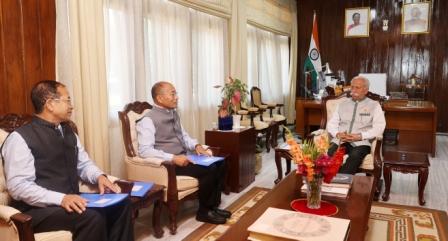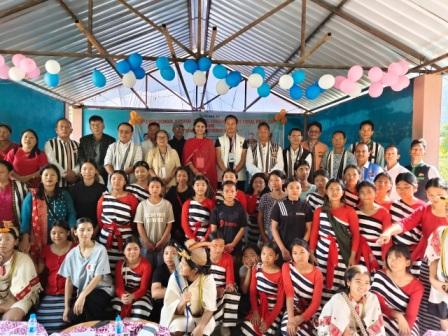-
State election commission holds meeting with political parties ahead of…
-
Privilege committee holds 5th sitting
-
Community volunteers trained on basic disaster management
-
Trade body launches protest seeking reinstatement of …
-
IFCSAP announces protest series seeking notification of APFRA rules…
-
Governor attends North East NSS Festival
-
Arunachal to hold Panchayat, municipal bodies election on Dec 15…
-
 State Election Commissioner calls on Governor
State Election Commissioner calls on Governor
-
 DC inaugurates school amenity
DC inaugurates school amenity
-
AAPSU women’s wing conducts awareness drive for schoolgirls in Pakke-Kesang
Jabalpur, Nov 26: Gabriel D. Wangsu, the Agriculture Minister of Arunachal Pradesh, visited the Indian Council of Forestry Research and Education (ICFRE) at the Tropical Forest Research Institute (TFRI) in Jabalpur, Madhya Pradesh, to explore innovative agro forestry practices and strengthen ties for environmental conservation.
“Both our states are home to rich tribal communities and biodiversity. These similarities have brought us here today to learn how efforts in Madhya Pradesh are encouraging tribal participation in forest conservation and ecosystem balance,” Wangsu said, highlighting the shared heritage of Arunachal Pradesh and Madhya Pradesh.
Expressing his deep connection with forests, Wangsu emphasized the urgency of addressing global warming. “Global warming has arrived at our doorstep, it is no longer a distant phenomenon. Collaborative efforts are essential to mitigate its impact, and we are here to understand and replicate the successful initiatives undertaken by TFRI in our state.”
The Director incharge of TFRI Smt. Neelu Singh delivered a detailed presentation on the institute’s ongoing projects, funding agencies, and collaborative efforts with industries. She also showcased the institute’s state-of-the-art laboratories, germplasm conservation programs, and sophisticated research instruments. Highlighting their conservation and genetic improvement programs, she explained how biotechnology and propagation techniques are being used to improve forest species.
The presentation also touched on the institute’s work with medicinal plants, bamboo production training for local farmers, and efforts to engage Madhya Pradesh’s tribal community, which is home to a good percent of the tribal population of the country. The Director underlined their commitment to combating global warming and their dissemination of new research discoveries through seminars and training programs.
Minister Wangsu and his team toured the institute’s laboratories and key research centers, gaining insight into critical projects. They also visited the betel vine cultivation farm in Burahgarh to observe sustainable agricultural practices in action.

Kenter Joya Riba
(Managing Editor)She is a graduate in Science with post graduation in Sociology from University of Pune. She has been in the media industry for nearly a decade. Before turning to print business, she has been associated with radio and television.
Email: kenterjoyaz@easternsentinel.in / editoreasternsentinel@gmail.com
Phone: 0360-2212313

